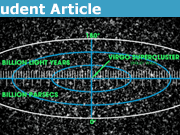Why the Need of Infinity in Physics
It is beyond doubt that the notion of infinity lies somewhere near the core of all mathematics, probably in a finite vicinity of zero. But where does it lie in physics? There’s always the feeling you get when you study physics really deeply that you’re doing no more than applied mathematics. Unless you’re a modern Michael Faraday, i.e. a guy who works in a team who works in a (sometimes really big) laboratory from a (typically huge) facility or research institutes like CERN or Fermilab, and your day-to-day job involves working with electronic equipment.
Since physics has not lost its experimental side (and will never do so), I’m trying to mentally reconcile the mathematical notion of infinity with the experimental side of physics. I’ve always thought that man-made machinery cannot truly probe infinity, no matter how hard we tried, or how fancy and expensive a telescope/microscope can be. The universe (if only one) can be deemed infinite (if at all) only by a theorem, at least that’s what a theorist (blood-related or not to Stephen Hawking or Roger Penrose) should hope for. Infinity remains a part of mathematics we could or could not do without in the physical theories. But it cannot be felt.
A quick review of the elementary theories shows that: Newtonian mechanics has the distinct feature that any of its notions (labeled as physical quantities) can be freely made infinite, either time, distance, velocity/instantaneous speed, accelerations, forces, etc., even if we could never measure infinite time, or an orbit of infinite radius, for example. Special relativity puts a serious bound on speed, but time and distance can still flow from – to + infinity and the whole relativity (especially GR) has nice results when such limits are taken. Statistical mechanics is anchored in reality, there’s never an infinite number of particles, but Avogadro’s number is big enough to be considered the physicists’ true infinity.
I’ve left quantum physics last, because here, as I will show, infinities are at the heart of all the (standard) theory. If you’re doing experiments and you wish to measure photon energies in the visible light spectrum from a particular transition in the Hydrogen atom, you have the option to use Balmer’s formula (1885) to compare results against the theory. But you know in 2016 that the currently accepted explanation of Balmer’s formula uses either the matrix mechanics of Born, Heisenberg, and Jordan (1925), or the wave mechanics of Schrödinger (1926). There’s no infinity in Balmer’s formula (yes, that “n” can go as high as one wishes, but experiment really puts a bound on it), but there’s one not really hidden in either form of Quantum Mechanics: the matrices of Born, Heisenberg and Jordan are necessarily infinite (as noted first by Born and Jordan in “Zur Quantenmechanik” (Zeitschrift für Physik, 1925, p. 780). Schrödinger’s operators for coordinate and momentum make sense only in an infinite-dimensional Hilbert space, as a consequence of Stone-von Neumann’s theorem (1931).
Let’s sum it up: numerical calculations performed by human-programmed computers use mathematics which in turn uses the notion of infinity. Man-made measuring apparatus never have infinite scales. A physicist cannot perceive infinity through his senses.
In Newtonian mechanics, you can replace the mathematical infinity with an arbitrarily large number (Avogadro’s number expressed in meters, seconds, km/s, Joules) and some integrals will need computer power to be performed. You can remove infinity from this theory at a conceptual level. Relativity is a form of mechanics, you can again let infinity be replaced by a huge number and get rid of it. Do let a Heisenberg matrix be finite (Avogadro’s number of lines and columns) and you won’t have a quantum theory whatsoever. [as a side note: do let Planck’s constant be = 0 and you won’t have a quantum theory again].
I like chess, table tennis and beautiful women.
Probably the biggest fan of Pete Sampras and Novak Djokovic in my country. :)





Leave a Reply
Want to join the discussion?Feel free to contribute!